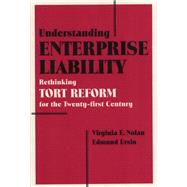- ISBN: 9781566392303 | 1566392306
- Cover: Hardcover
- Copyright: 12/30/1994
In recent years critics have assailed the cost, inefficiency, and unfairness of American tort law, including products liability and medical malpractice. Yet victims of accidental injury who look to the tort system for deserved compensation often find it a formidable obstacle. Those who seek to reform tort law find legislatures, including the United States Congress, paralyzed by the clash of powerful special interest groups.
Understanding Enterprise Liability sheds new light on the tort reform debate by challenging its fundamental assumptions. Offering historical insight and fresh perspectives on the politics and possibilities for sensible reform, Virginia Nolan and Edmund Ursin pragmatically assess alternative routes to a workable, balanced, and equitable system of compensation for personal injury.
Tort reformers commonly equate "enterprise liability" with strict products liability and other expansive tort developments of recent decades. Damages reform and no-fault alternatives are, in turn, seen as a repudiation of a failed theory of enterprise liability. In contrast, the authors demonstrate that both strict product liability and no-fault compensation plans are a product of the enterprise liability theory first articulated early in this century by Leon Green and Karl Llewellyn. As the theory of enterprise liability matured, damages reform became an integral part of the enterprise liability agenda, establishing that both no-fault and damages reform are an aspect, not a repudiation, of enterprise liability theory.
Nolan and Ursin examine proposals to displace tort law by no-fault schemes, including the medical no-fault proposal of the American Law Institute's Reporters' Study on Enterprise Responsibility for Personal Injury. Noting that even automobile no-fault plans have been blocked by special interests and legislative stalemate, the authors suggest that we rethink the common assumption that courts have no role to play in tort reform. Their own specific proposal, based on the precedent of strict products liability, incorporates the insights of no-fault compensation plan scholarship to create an enterprise liability doctrine that should appeal to courts and to tort reformers.
Understanding Enterprise Liability sheds new light on the tort reform debate by challenging its fundamental assumptions. Offering historical insight and fresh perspectives on the politics and possibilities for sensible reform, Virginia Nolan and Edmund Ursin pragmatically assess alternative routes to a workable, balanced, and equitable system of compensation for personal injury.
Tort reformers commonly equate "enterprise liability" with strict products liability and other expansive tort developments of recent decades. Damages reform and no-fault alternatives are, in turn, seen as a repudiation of a failed theory of enterprise liability. In contrast, the authors demonstrate that both strict product liability and no-fault compensation plans are a product of the enterprise liability theory first articulated early in this century by Leon Green and Karl Llewellyn. As the theory of enterprise liability matured, damages reform became an integral part of the enterprise liability agenda, establishing that both no-fault and damages reform are an aspect, not a repudiation, of enterprise liability theory.
Nolan and Ursin examine proposals to displace tort law by no-fault schemes, including the medical no-fault proposal of the American Law Institute's Reporters' Study on Enterprise Responsibility for Personal Injury. Noting that even automobile no-fault plans have been blocked by special interests and legislative stalemate, the authors suggest that we rethink the common assumption that courts have no role to play in tort reform. Their own specific proposal, based on the precedent of strict products liability, incorporates the insights of no-fault compensation plan scholarship to create an enterprise liability doctrine that should appeal to courts and to tort reformers.







